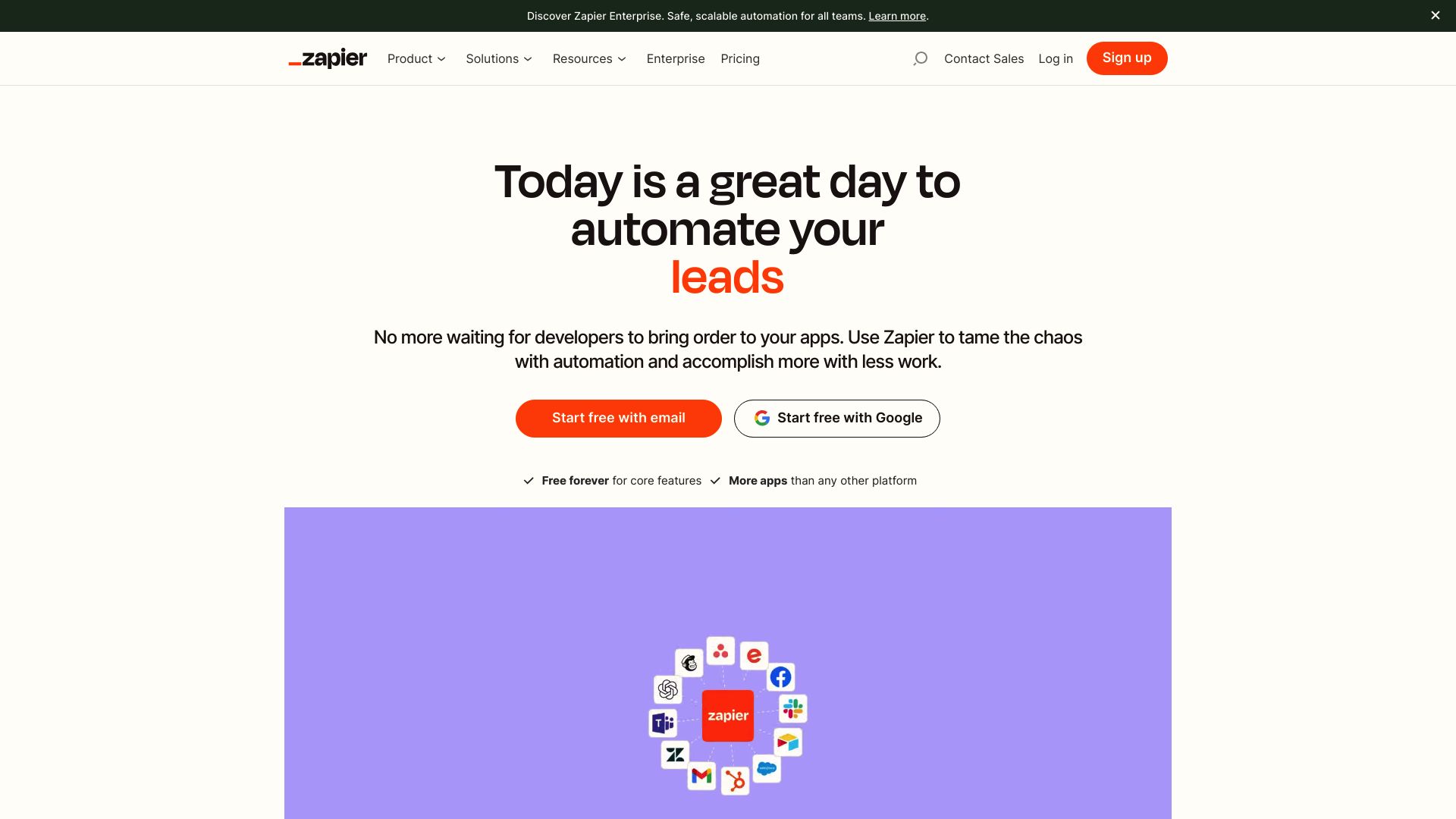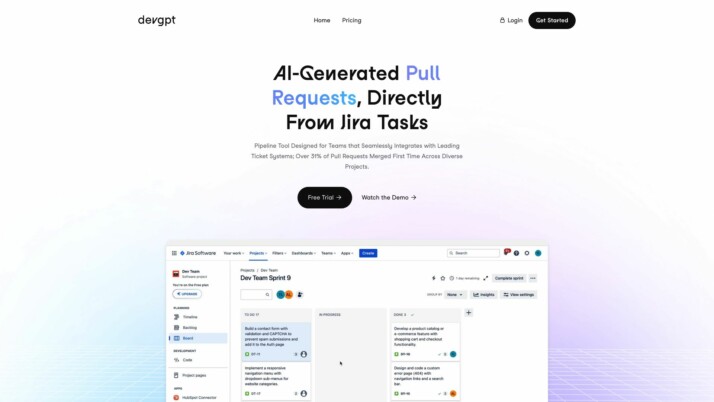Zapier vs. DevGPT vs. SmythOS: AI Automation Showdown
AI-powered automation revolutionizes how businesses operate, but choosing the right platform can be daunting. This comparison delves into Zapier vs. DevGPT, and SmythOS, three distinct solutions addressing different aspects of workflow optimization and AI integration. Zapier connects thousands of apps for no-code automation, DevGPT transforms natural language into code, while SmythOS offers a comprehensive AI agent framework. We’ll explore each platform’s strengths, limitations, and ideal use cases, empowering you to make an informed decision that aligns with your organization’s needs. Whether you’re a developer seeking to streamline coding tasks, a business leader looking to enhance productivity, or an AI enthusiast exploring cutting-edge capabilities, this analysis provides valuable insights into the evolving landscape of AI-driven tools.
Zapier Overview
Zapier empowers users to automate workflows by connecting over 6,000 apps without coding. The platform’s visual builder enables quick creation of multi-step “Zaps” that trigger actions across various services, streamlining repetitive tasks for businesses of all sizes.


Zapier’s strength lies in its extensive app integrations and user-friendly interface. The platform caters to non-technical users while offering advanced options for developers. Its no-code approach democratizes automation, allowing teams to boost productivity without relying on IT departments.
Zapier empowers users to automate workflows by connecting over 6,000 apps without coding. The platform’s visual builder enables quick creation of multi-step “Zaps” that trigger actions across various services…
While Zapier excels at connecting existing services, it lacks native AI agent capabilities. The platform doesn’t offer features like autonomous decision-making or natural language processing. This limitation may disappoint users seeking more advanced AI-driven automation.
Zapier’s integration prowess extends to APIs, webhooks, and scheduled tasks. The platform supports OAuth authentication and provides logs for monitoring workflow execution. These features, combined with team collaboration tools, position Zapier as a versatile solution for businesses looking to optimize their digital processes.
DevGPT Overview
DevGPT transforms natural language prompts into executable code, streamlining software development workflows. This open-source AI assistant integrates with GitHub and Jira, automating pull requests and code generation tasks.


Screenshot of DevGPT Website
DevGPT leverages GPT-4 and Codex to power its core functionality. The platform trains on a developer’s codebase, producing personalized outputs that match individual coding styles. Users can refine generated code through inline comments, further tailoring results to their needs.
DevGPT transforms natural language prompts into executable code, streamlining software development workflows.
Initial adopters report significant time savings, with some gaining over 10 hours per week. DevGPT’s focus on contextual outputs and existing tool integration sets it apart from other coding assistants.
While DevGPT excels at automating repetitive tasks, it currently lacks more advanced features like hosted agents, autonomous operation, or multi-agent collaboration. The platform primarily serves individual developers and small teams, with potential for future expansion to larger organizations.
Feature Comparison
SmythOS stands out with its comprehensive AI agent capabilities, while Zapier and DevGPT focus on more specialized areas. SmythOS offers hosted agents for development and production, multimodal interactions, and autonomous problem-solving — features absent in both Zapier and DevGPT.
Where Zapier excels at connecting existing web services through its visual builder, it lacks native AI agent functionality. DevGPT specializes in code generation from natural language prompts but doesn’t provide the broad AI agent framework of SmythOS. Neither Zapier nor DevGPT match SmythOS’s capabilities in areas like multi-agent collaboration, constrained alignment, or deployment flexibility.
SmythOS’s robust security features, including data encryption and OAuth support, outpace both competitors. Its integration with various AI models and APIs also surpasses Zapier’s app connections and DevGPT’s code-focused approach. While all three offer some form of analytics, SmythOS provides more comprehensive logs and monitoring tailored for AI agent oversight.
Feature Comparison Table
| Zapier | DevGPT | SmythOS | |
|---|---|---|---|
| CORE FEATURES | |||
| AI Agents | ❌ | ✅ | ✅ |
| Hosted Agents (Dev, Production) | ❌ | ❌ | ✅ |
| Environments (Dev, Production) | ✅ | ❌ | ✅ |
| Visual Builder | ✅ | ❌ | ✅ |
| No-Code Options | ✅ | ❌ | ✅ |
| Memory & Context | ❌ | ✅ | ✅ |
| Autonomous Agents | ❌ | ❌ | ✅ |
| Explainability & Transparency | ❌ | ❌ | ✅ |
| Multimodal | ❌ | ❌ | ✅ |
| Problem-Solving Capabilities | ❌ | ✅ | ✅ |
| Multi-Agent Collaboration | ❌ | ❌ | ✅ |
| Human-AI Interaction | ❌ | ✅ | ✅ |
| Audit Logs for Analytics | ✅ | ❌ | ✅ |
| Bulk Work | ✅ | ❌ | ✅ |
| Agent Work Scheduler | ❌ | ❌ | ✅ |
| Logs & Monitoring | ✅ | ❌ | ✅ |
| SECURITY | |||
| Constrained Alignment | ❌ | ❌ | ✅ |
| Data Encryption | ✅ | ❌ | ✅ |
| OAuth | ✅ | ❌ | ✅ |
| IP Control | ❌ | ❌ | ✅ |
| COMPONENTS | |||
| Foundation AIs | ❌ | ❌ | ✅ |
| Huggingface AIs | ❌ | ❌ | ✅ |
| Zapier APIs | ✅ | ❌ | ✅ |
| All other APIs, RPA | ✅ | ❌ | ✅ |
| Classifiers | ❌ | ❌ | ✅ |
| Logic | ❌ | ❌ | ✅ |
| Data Lakes | ❌ | ❌ | ✅ |
| DEPLOYMENT OPTIONS (EMBODIMENTS) | |||
| Deploy as API | ✅ | ❌ | ✅ |
| Deploy as Webhook | ✅ | ❌ | ✅ |
| Staging Domains | ✅ | ❌ | ✅ |
| Production Domains | ✅ | ❌ | ✅ |
| API Authentication (OAuth + Key) | ✅ | ❌ | ✅ |
| Deploy as Site Chat | ❌ | ❌ | ✅ |
| Deploy as Scheduled Agent | ❌ | ❌ | ✅ |
| Deploy as GPT | ❌ | ❌ | ✅ |
| Scalability | ✅ | ❌ | ✅ |
| DATA LAKE SUPPORT | |||
| Hosted Vector Database | ❌ | ❌ | ✅ |
| Sitemap Crawler | ❌ | ❌ | ✅ |
| YouTube Transcript Crawler | ❌ | ❌ | ✅ |
| URL Crawler | ❌ | ❌ | ✅ |
| PDF Support | ❌ | ❌ | ✅ |
| Word File Support | ❌ | ❌ | ✅ |
| TXT File Support | ❌ | ✅ | ✅ |
Best Alternative to Zapier and DevGPT
SmythOS emerges as the superior alternative to Zapier and DevGPT, offering a comprehensive AI agent platform that combines ease of use with powerful features. Our drag-and-drop interface enables rapid development of sophisticated AI agents without requiring extensive coding knowledge. This visual approach surpasses Zapier’s automation tools and DevGPT’s code generation focus, making advanced AI capabilities accessible to a broader audience.
SmythOS emerges as the superior alternative to Zapier and DevGPT, offering a comprehensive AI agent platform that combines ease of use with powerful features.
We excel in versatility, supporting multimodal interactions and autonomous problem-solving — capabilities absent in both Zapier and DevGPT. While Zapier connects existing web services, it lacks native AI functionality. DevGPT specializes in code generation but doesn’t provide the extensive AI framework SmythOS offers. Our platform enables multi-agent collaboration, constrained alignment, and flexible deployment options, outpacing both competitors in these critical areas.
SmythOS prioritizes security with robust features like data encryption and OAuth support, addressing enterprise-level concerns more comprehensively than Zapier or DevGPT. Our integration with various AI models and APIs surpasses Zapier’s app connections and DevGPT’s code-centric approach, providing a more adaptable solution for diverse AI applications.
Our platform’s scalability and extensive deployment options set it apart. Users can deploy AI agents as APIs, webhooks, chatbots, or scheduled tasks, offering unmatched flexibility compared to Zapier’s limited deployment options and DevGPT’s focus on code output. This versatility makes SmythOS ideal for businesses of all sizes, from startups to large enterprises, looking to leverage AI across various use cases.
Users can deploy AI agents as APIs, webhooks, chatbots, or scheduled tasks, offering unmatched flexibility compared to Zapier’s limited deployment options and DevGPT’s focus on code output.
By choosing SmythOS, users gain access to a future-proof platform that continually evolves to meet emerging AI trends and business needs. Our commitment to user-friendly design, ethical AI practices, and ongoing innovation ensures that SmythOS remains at the forefront of AI agent development, making it the clear choice for those seeking a powerful, versatile, and accessible AI solution.
Conclusion
Zapier, DevGPT, and SmythOS each offer unique approaches to automation and AI-assisted development. Zapier excels in connecting web services through its extensive app integrations and user-friendly interface, making it ideal for businesses seeking to streamline workflows without coding. DevGPT shines in its ability to transform natural language prompts into code, saving developers significant time in their daily tasks.
However, SmythOS emerges as the superior choice for those seeking a comprehensive AI agent platform. Our solution combines the best of both worlds — offering the ease of use found in Zapier’s visual builder with the AI-powered capabilities reminiscent of DevGPT. SmythOS goes further by providing hosted agents, multimodal interactions, and autonomous problem-solving capabilities that neither Zapier nor DevGPT can match.
For businesses and developers looking to harness the full potential of AI agents, SmythOS offers unparalleled flexibility and power. Our platform supports multi-agent collaboration, constrained alignment, and deployment options that span from APIs to chatbots and scheduled agents. Explore our diverse range of AI-powered agent templates to jumpstart your journey into AI automation. Ready to revolutionize your workflow? Create a free SmythOS account today and experience the future of AI-driven productivity with no risk and unlimited potential.
Last updated:
Disclaimer: The information presented in this article is for general informational purposes only and is provided as is. While we strive to keep the content up-to-date and accurate, we make no representations or warranties of any kind, express or implied, about the completeness, accuracy, reliability, suitability, or availability of the information contained in this article.
Any reliance you place on such information is strictly at your own risk. We reserve the right to make additions, deletions, or modifications to the contents of this article at any time without prior notice.
In no event will we be liable for any loss or damage including without limitation, indirect or consequential loss or damage, or any loss or damage whatsoever arising from loss of data, profits, or any other loss not specified herein arising out of, or in connection with, the use of this article.
Despite our best efforts, this article may contain oversights, errors, or omissions. If you notice any inaccuracies or have concerns about the content, please report them through our content feedback form. Your input helps us maintain the quality and reliability of our information.
